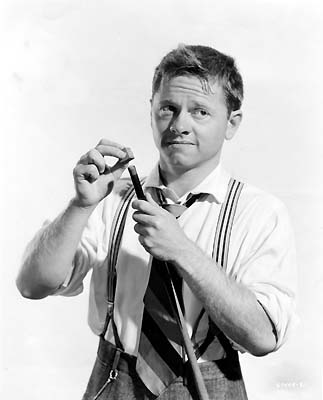 Mickey Rooney, who began his long film career as a silent movie kid star, became a top Hollywood attraction in Andy Rooney films and a partner with Judy Garland, before stretching his credits into the 90s, died Sunday at 93.
Mickey Rooney, who began his long film career as a silent movie kid star, became a top Hollywood attraction in Andy Rooney films and a partner with Judy Garland, before stretching his credits into the 90s, died Sunday at 93.
An Emmy winner and four time Oscar nominee, Rooney in his time was also a leader in celebrity gossip, having married eight women.
He remained active into his 90s, even appearing on the second to last show of “The Tonight Show with Jay Leno” in February. But in that show, he was left to sit in the audience and wave, as stars used to do in the oldest days of TV, rather than come on stage, where all manner of celebrities, from Carol Burnett to Jack Black, stepped in to give well wishes to the departing Leno.
Rooney may not have been trusted to do only that. A bigger than life personality in a small body, he was so known for tooting his own horn with bluster, Dana Carvey created a recurring caricature of him on “Saturday Night Live” decades ago (at a time when the regular audience may not even have known who the old star had been).
I met him once, nine years ago, he was the hit of a “Pioneers of Television” panel at the TV Critics Association press tour, where his manic reminiscences drew barbs even from other elderly panelists.
“I want to be straight with you,” went one Rooney monologue early in the disastrous session. “Television is the most wonderful thing in the world.” He skipped quickly to: “A lot of people don’t remember that Cecil B. DeMille, the great Cecile B. DeMille of Hollywood. He would say, `This is Cecil B. DeMille of Hollywood. Tonight we bring you … and they’d have some special guest, and it was a thrilling thing.”
Later, he confided, “You know … the film business was started by the Jewish people.”
“Get out,” deadpanned Carl Reiner, also on the panel.
Rooney, in his show-biz spiel, did not stop.
“Louis B. Mayer, Harry Cohn, Adolph Zukor, and the list goes on,” he said. “I was honored to be at Metro-Goldwyn-Mayer for 19 years, and I worked with the world’s greatest. Who can be greater than Judy Garland, or Fred Astaire, Gene Kelly, Donald O’Connor, Debbie Reynolds, William Powell…”
Rooney stirred later when someone brought up vaudeville.
“May I stop you?” he interrupted a questioner. “It was burlesque. There were burlesque theaters before vaudeville… That’s where real comedy came from. … They’d do jokes that would knock you dead: ‘Why does a chicken cross the street? To get to the other side.’ `Who was that lady you were with last night? That was no lady; that was my wife.”’
The roiling laughter in the room stopped in both instances in respectful silence to the oldest jokes in history.
What could be a more stale commodity in comedy? How about James Cagney impersonations? There was more than one dueling impression at one point in the haywire session, constantly punctuated with Rooney’s blurting out items from his resume.
Red Buttons at least tried to defuse the situation, asking, ‘By the way, Mickey, was Lincoln a nice guy?”